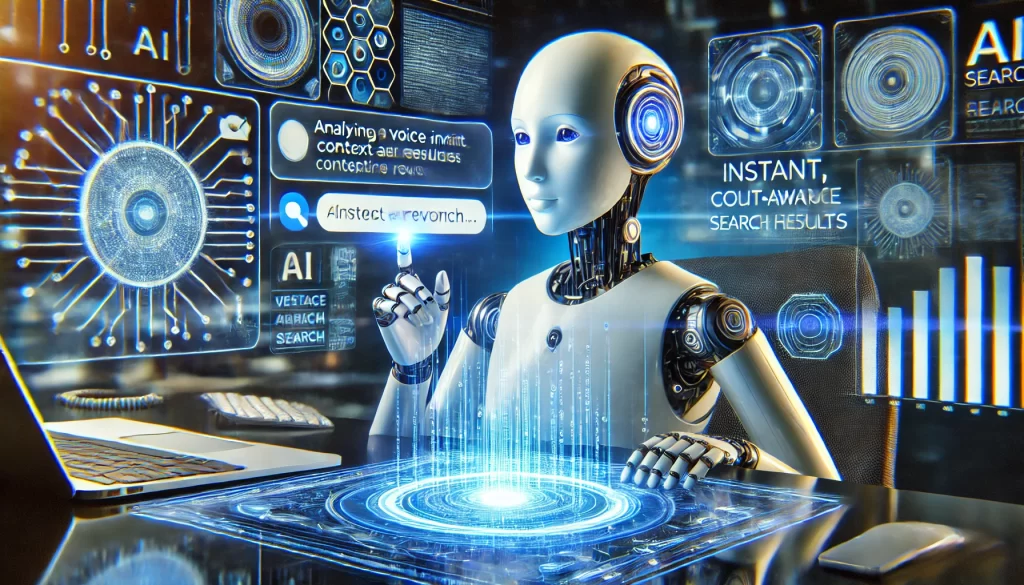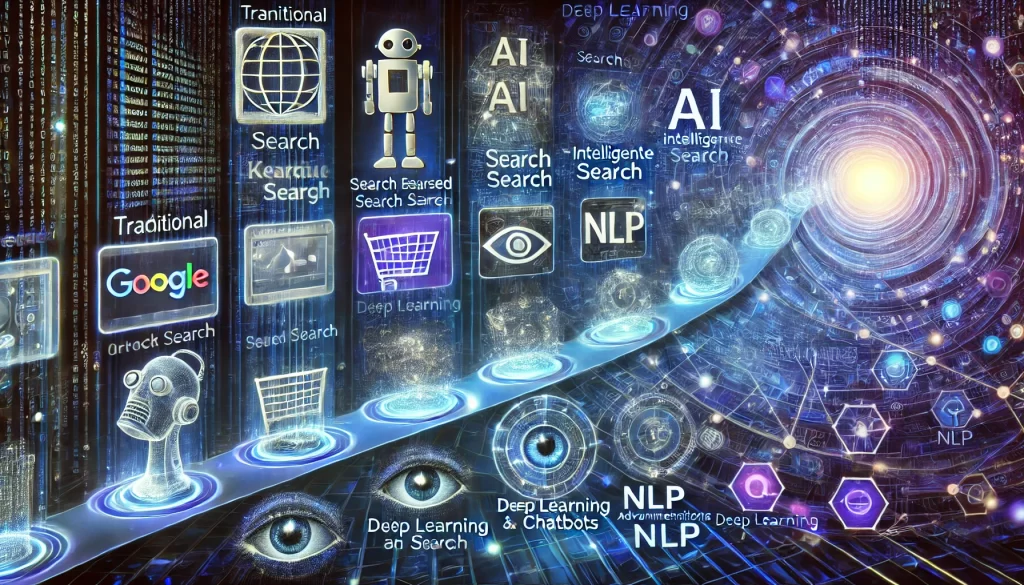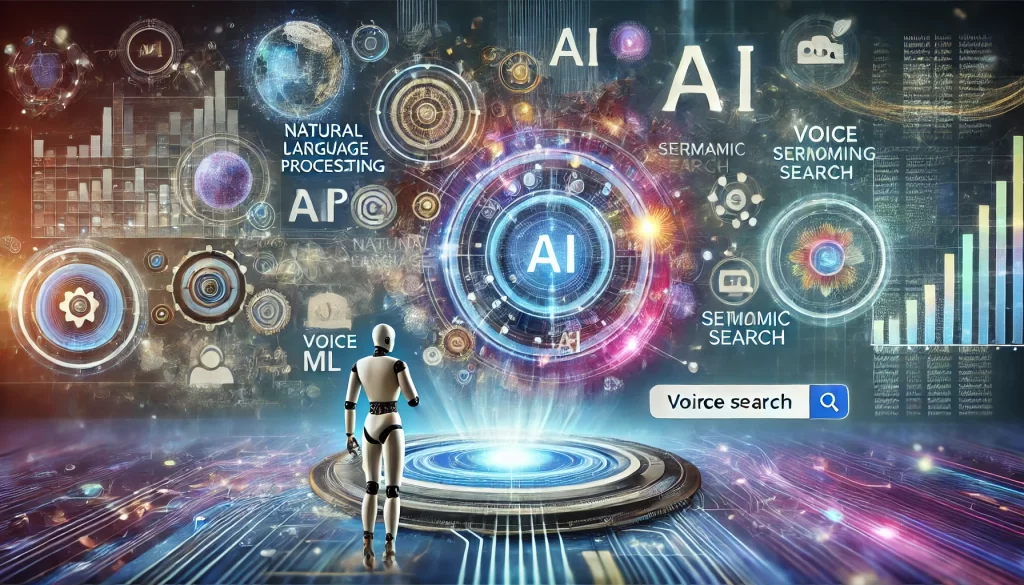Introduction
The extent to which technology has changed can be gauged from the fact that the way of online search has completely changed today. Earlier, where people used to have only keyword-based search engines, they have now transformed into AI-driven, context-aware and highly personalized experiences. AI-powered search engines and chatbots are making online platforms more intuitive, conversational and effective for users. In this article, we will look at how AI is changing online search, the impact of AI-powered chatbots and what place AI-driven search technology will have in the future.

The growth of online search
Until a few years ago, search engines used to index a large amount of data, after which the search engine used to show results based on the relevance of keywords. This method had major problems such as not understanding user intent, showing irrelevant results and lack of personalized experience.
Well, with time, today search engines have changed so much that the result of anything is accurate today, the reason for which is the smartness of artificial intelligence. Artificial intelligence provides relevant results by understanding the correct context of user queries and can even predict the user’s need in advance. Following are the major technologies that shape AI-driven search:
1. Natural Language Processing (NLP)
Basically, NLP helps search engines understand and process human language. It now has the ability to go beyond keywords and understand entire sentences or questions.
2. Machine Learning (ML)
Machine learning algorithms improve search algorithms based on user behavior and past data and search history. It continuously learns and is able to give more relevant results to users.
3. Voice search and conversational AI
AI is now making voice search more accurate and effective. Google Assistant, Siri, and Alexa are prime examples of this, allowing users to search without typing.
4. Semantic Search
Today’s time search engines provide results not just by keywords but by understanding the actual meaning of the words. This technology gives answers based on context and user intent.
5. Personalization Algorithms
Search engines are now customizing results based on the user’s previous search history, interests, and location. This provides a highly personalized experience.
6. Deep learning algorithms
This technology deeply understands user behaviour and provides more accurate and relevant results.
Impact of AI on Search Engines
1. Understanding user intent
As I said earlier, now AI-driven search engines do not just rely on keywords, but also understand the actual intent of the user. For example, Google’s BERT and MUM model helps in understanding complex and conversational queries.
2. Conversational AI and voice search
With the ease of search engines, more people are using voice search nowadays. AI has now made voice search so advanced that it can also understand spoken language and provide accurate answers.
3. Visual and multimodal search
Now it is not necessary that you go to Google and search anything by typing text, but now you can search on Google Lens with the help of just a picture.
4. Personalization and Predictive Search
Google and Bing are now using AI to understand user behavior and present search results according to their interests.
5. Impact of AI-powered chatbots
Chatbots are now being added to search functionality, allowing users to get information faster. It also automates customer support, reducing costs for businesses.

Challenges associated with AI-driven search
Although there are many benefits of AI-powered search, there are also some challenges:
1. Privacy concerns
AI collects a lot of data from users, raising questions about privacy.
2. Risk of bias
The data in AI algorithms can lead to bias, which can lead to incorrect or misleading results.
3. Excessive dependence
If users become overly dependent on AI search, it can affect their independent thinking.
4. Data security
Users’ personal information needs to be kept safe, so that cyber crimes can be avoided.
5. Technical complexity
Expertise is required to use AI properly. This technology is still evolving and implementing it correctly can be challenging.

👉 “Atul Subhash Case & The Misuse of Marriage Laws in India”
👉 From Spirituality to Virality: The Unseen Side of Kumbh Mela 2025 – 24 Insight
👉 Delhi cm news | Delhi Election Result | Rekha gupta biography
AI-Powered Search and Chatbots in the Future
AI-powered search is likely to become even more advanced in the future.
1. More human conversational AI
In the future, AI will be more natural and conversational, giving users a better experience. Artificial intelligence is enabling every sector of business now. So, the future of AI-Driven search will replace the traditional search.
2. Integration with Augmented Reality (AR)
Search engines can now also integrate with AR technology, giving users a more immersive experience.
3. Better Predictive Search
In the future, AI will be able to identify the need of the users in advance and provide solutions to them in advance.
Conclusion
It is true that today with the advent of artificial intelligence, AI-powered search and chatbots have completely changed the way of finding information online. With the development of NLP (natural language processing), voice search, personalization and intelligent chatbots, finding any information has become very easy and accurate today. Today, with the help of artificial intelligence, search engines are not just dependent on keywords, but are providing more relevant and accurate results by understanding the user’s intent. The increasing use of voice search has made the search process faster, while personalized search presents results according to the users’ interest. Also, AI-powered chatbots are not only helping in giving quick answers but also making customer support easier. In the future, AI search technology will be even more advanced, giving users a better and more interactive digital experience than before. As technology advances, AI will play a vital role in bringing a new revolution in the world of online search. It would not be wrong to say that artificial intelligence will change the way we search forever.
If you liked this article, please share it and let us know your suggestions so we can continue to improve.